NOTE: This page was first published in November 2017. We’ve just reviewed, edited and updated it in December 2018 ready for the 2019 entrance year. Part of our update was to add quick and easy web forms so that you can send a message of interest to the admissions offices so that they can email you further information. After each school, there is a link to click on, and a lightbox will pop up for you to enter a few details.
This article covering the best petroleum engineering schools in the USA is one of the most important on our website. If you’re a regular visitor, you’ll know that we provide some high level, technical assistance to oil and gas professionals. We now want to expand our offerings to help those who are interested in a fruitful oil and gas career, regardless of age and experience level.
We recently published a post entitled ‘The best Universities in Europe for an oil and gas career’ and it was the first in a series. According to our website visitor statistics, we realize that the majority of our readers aren’t European and that the USA has the largest readership.
For the European focused article, we researched, and also reached out to our network. The core team here at drillers.com are British, so we got plenty of ideas, suggestions and points to add to that article.
Crowdsourced research
For an article on the USA, I (hi, Jason here!) realized that I’m not really qualified, and the chance of a mistake and/or omission was high. I have American contacts (howdy!) but not enough to count as a true sample size. So, I asked for help from the Oilpro community who had/have a better handle on the reality in the oil industry than anywhere else that I could find online.
What I did, was research a list of what ‘the internet’ thought should be in the top 15, and then posted the list on (the now closed) Oilpro.
So, after some back and forth, some additions and deletions, I got down to a different list. After quickly checking some of the credentials of my sources, re-researched as I whittled, pruned and manicured to get the definitive list. The whole process was a lot of fun.
As far as rankings go, this matter is subjective, and we’ve placed them roughly in order, with the top 5 being arguably the best. We don’t want to get into a situation where complaints or scuffles break out, so the list is not numbered!
What we didn’t do was include the ‘top 20’ in order to gain extra internet traffic, or for affiliate/profit-making reasons. This is our honest top 10, based on research and networking.
So now, without further ado… We unveil the final drillers.com list of…
The 10 top petroleum engineering schools in the US:
The University of Texas at Austin – Cockrell School of Engineering
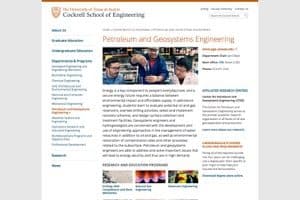 So, the Cockrell School of Engineering is right at the top of our list. Whilst this article isn’t strictly numbered in order (who could decide that?), UT at Austin came up most in our research, and networking among industry professionals.
So, the Cockrell School of Engineering is right at the top of our list. Whilst this article isn’t strictly numbered in order (who could decide that?), UT at Austin came up most in our research, and networking among industry professionals.
We’d probably go so far as saying the top 5 here are the ‘top 5 in the USA’, that’s as far as we’d go in risking an angry backlash…
Within the region of 7-8000 students studying 9 undergraduate degrees, and 13 graduate programs, this is a substantial school. As we all know, economies come at scale and the quality of resources available to students in unbeatable. This means that as long as you’re smart and dedicated enough, you can achieve more than you ever thought possible at a school like this.
Different reviews over the years tend to rank the Cockerel School of Engineering in the top 1 or 2 in the USA. The Petroleum and Geosystems Engineering department is particularly well respected, often coming first in undergraduate, and graduate programs.
Get admissions information for the University of Texas at Austin
University of Tulsa – McDougall School of Petroleum Engineering
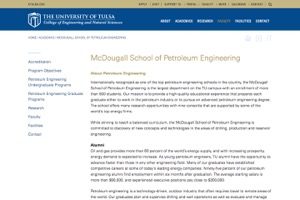 The Internationally acclaimed McDougall School of Petroleum Engineering at UT was another easy decision for the top few spots on this page. This department is the largest and most important on the UT campus.
The Internationally acclaimed McDougall School of Petroleum Engineering at UT was another easy decision for the top few spots on this page. This department is the largest and most important on the UT campus.
With an excellent reputation and close industry links, 95% of graduates manage to secure employment within 6 months of leaving.
As with many of the top European petroleum engineering schools, the postgraduate programs have a focus on innovation and technological progress. The research departments work in co-operation with multiple governmental and industry agencies.
One key differential at UT is that undergraduates can also get involved with, and work alongside postgraduate researchers. This fosters an atmosphere of empowerment. It also helps create a backdrop of mutual respect and understanding whatever the level of experience. These qualities are crucial when working in challenging and dangerous environments.
Get admissions information for the University of Tulsa
Colorado School of Mines
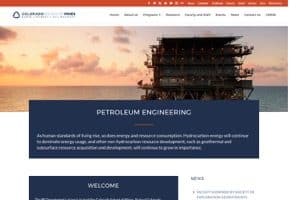 The Colorado School of Mines, also known simply as ‘mines’ benefits from many of the same situational features of all top petroleum engineering schools. Firstly, the location is close to the industries production, with many geological formations that are actively in production.
The Colorado School of Mines, also known simply as ‘mines’ benefits from many of the same situational features of all top petroleum engineering schools. Firstly, the location is close to the industries production, with many geological formations that are actively in production.
Secondly, close industry links enable collaboration, internships and information sharing. Mines has an SPE chapter and benefits from knowledge that is pooled by the most important industry body. The SPE President spoke at the school recently, and these types of events allow immersion into the industry mindset for students.
Other special relationships include the:
- American Rock Mechanics Association
- American Association of Drilling Engineers
- U.S. Geological Survey
- National Renewable Energy Laboratory
Students are also encouraged to take part in field operations in the summer break while being guided by postgraduates. An exchange program allows one semester swaps with the Petroleum Engineering Departments of the Mining University of Leoben, Austria. The same applies to the Technical University in Delft, Holland. (Both of which appeared on our list of the top oil and gas universities in Europe). Mines also has the exchange arrangement with the University of Adelaide in Australia.
Get admissions information for the Colorado School of Mines
University of Oklahoma Norman Campus
 The Mewbourne School of Petroleum and Geological Engineering (MPGE) at the University of Oklahoma has appeared on most top lists over the years. Students graduating from MPGE consistently achieve employment rates of over 90% year on year.
The Mewbourne School of Petroleum and Geological Engineering (MPGE) at the University of Oklahoma has appeared on most top lists over the years. Students graduating from MPGE consistently achieve employment rates of over 90% year on year.
As with most of the other entrants on our list, the Petroleum and Geological Engineering programs are among the oldest in the country. In the workforce, graduates from MPGE are very well represented because of the numbers of successful graduates each year, and the ease of which they obtain work.
This is partly down to the quality of the research departments here. MPGE have distinct departments that solve different industry problems. The departments are as follows:
- Integrated Core Characterization Center (IC3) that includes a complete Amoco Rock Physics Laboratory
- Integrated PoroMechanics Institute (iPMI)
- Well Construction Technology Center (WCTC)
- Institute for Applied Surfactant Research (IASR)
- Unconventional Shale Gas Consortium (USGC)
As well as the sheer number of graduates in the workplace, MPGE alumni are numerous at high levels in companies. This also applies to the recognized industry associations such as the Society of Petroleum Engineers of which seven have served as president.
Get admissions information for the University of Oklahoma
Texas A&M University: Harold Vance Department of Petroleum Engineering
 From communicating with high-level industry sources, Texas A&M seemed to be in everyone’s top 10, in some cases the top 2 or 5! So, the home of the ‘Aggies’ comes in high up in our list.
From communicating with high-level industry sources, Texas A&M seemed to be in everyone’s top 10, in some cases the top 2 or 5! So, the home of the ‘Aggies’ comes in high up in our list.
The highly respected U.S. News & World Report ranks the Harold Vance department first in the USA for undergraduate, and third for graduate studies.
Why is Texas A&M so strong in the sector? It’s quite natural for a state to focus on its natural expertise and environmental assets. Texas is ‘oil country’ and always has been.
In a similar way to Aberdeen, Stavanger or Dubai, Texas is in the heart of an oil industry hub. When multiple leading oil and gas companies have head offices, and hundreds of smaller companies live and work in a location, there are benefits to students. The closeness between academia and industry fosters strong relationships that lead to internships, innovation and the overall betterment of the industry. Internships that involve working in the same area as you study and live make complete sense. Once suitably impressed, a company is likely to put you at the front of the queue to achieve a job upon graduation.
The USA is the leading country in the oil and gas industry and is likely to remain so. Qualifications from one of the best petroleum engineering schools, from the leading country, is likely to maximize your career potential!
Get admissions information for the Texas A & M University
The Louisiana State University
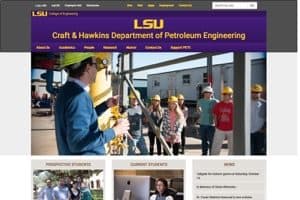 The Louisiana State Universities Craft and Hawkins Dept of Petroleum Engineering have run a highly respected program since the 1920s.
The Louisiana State Universities Craft and Hawkins Dept of Petroleum Engineering have run a highly respected program since the 1920s.
Like other entrants on our list, Louisiana is very much an oil state, featuring in the top four in the United States for the last half a century. The oil and gas industry has been responsible for approximately half of the revenue of the state during this period.
When we consider the importance of the O+G industry, the close proximity of exploration and production of hydrocarbons, it makes sense that the offered programs are cutting edge.
The fact that LSU is the flagship university in the state adds to the importance of being among the top schools in the country.
Another reason why LSU made it into our list, is because of their Petroleum Engineering Research & Technology Transfer, or PERTT, Laboratory. This is a full scale, hands-on training facility for students to understand borehole technology. If you’re not impressed by this, you might like to know that this is the only facility of its kind in a university in North America!
It’s not surprising that the oil and gas industry loves to recruit LSU Petroleum Engineering graduates and postgraduates. As well as the PERTT lab, LSU invests large resources in a number of research departments. Research areas of expertise include well control & blowout prevention, enhanced recovery, and downhole water sink technology. Alumni will leave LSU armed with strategies that can help make a difference in the field.
Get admissions information for the Louisiana State University
Pennsylvania State University
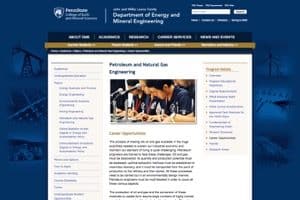 Pennsylvania State is steeped in oil and gas history, in fact, it was on August 27, 1859, that Edwin Drake first struck oil in Titusville, Pennsylvania. This discovery, in turn, led to the first super giant oil field in Bradbury.
Pennsylvania State is steeped in oil and gas history, in fact, it was on August 27, 1859, that Edwin Drake first struck oil in Titusville, Pennsylvania. This discovery, in turn, led to the first super giant oil field in Bradbury.
The first official course in petroleum engineering was offered in 1907 at Penn State entitled “Prospecting and Well Drilling”. Over the last 110 years, Penn State has stayed at the top of the rankings national and international rankings, not just for oil and gas, but for engineering in general.
The technique known as waterflooding was first developed at Penn State. There’s also a solid online learning program available, something that we’ll be covering in a future article.
As with all of our featured top schools, the Penn State research facilities are state of the art and highly regarded. Facilities available to students include a multi-phase fluid flow system laboratory and a drilling rig simulator.
Get admissions information for the Pennsylvania State University
Missouri University of Science & Technology (formerly Missouri-Rolla)
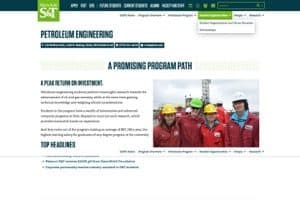 The Missouri University of S&T was originally established in 1870 and named the Missouri School of Mines and Metallurgy (MSM) which was a name that has described the focus for most of its history.
The Missouri University of S&T was originally established in 1870 and named the Missouri School of Mines and Metallurgy (MSM) which was a name that has described the focus for most of its history.
Then in 1963, the school was known as the University of Missouri at Rolla. (Rolla being the name of the area which is famous for lead and zinc mining).
As well as mining, energy has held an equal focus. Missouri’s first operational nuclear reactor was commissioned at the school in 1961. Now in the modern day, there’s a strong drive towards alternative energy, including a solar house and car project.
Oil and gas engineering has, of course, also been a focus throughout the history of the school. Many links to major oil companies have thrived for decades, with Exxon Mobil having strong links. MU also has a respected SPE chapter as well. A focus on exchanges and internships help students move towards an international oil and gas career, with available trips to the UK, Greece and Egypt.
Get admissions information for the University of Missouri
Texas Tech University Bob L. Herd Department of Petroleum Engineering
 Texas Tech University is the third Texas-based petroleum engineering school in our list. Whilst hardly surprising, the accolade is well deserved and with good reason.
Texas Tech University is the third Texas-based petroleum engineering school in our list. Whilst hardly surprising, the accolade is well deserved and with good reason.
The faculty are all very experienced, with a minimum of 15 years each, and Texas Tech has one of the largest Petroleum Engineering departments in the USA. The recently booming Permian Basin receives more than their fair share of graduates every year.
One of the biggest attractions of studying here is the new Terry Fuller Petroleum Engineering Research Building which was opened in 2014 and entirely donor funded. As is the case with all top schools, Texas Tech works closely with industry. The oil and gas industry invested $22.8 million, with money coming from Apache Corp, Pioneer Natural Resources, Linn Energy, Chevron, Anadarko and Oxy Petroleum. This is a classic case of voting with chequebooks!
Take a look at the department:
Another reason why Texas Tech appears in our top 10 is that they have the largest (on campus) test well. A Petroleum Engineering Advisory board helps students to stay up to date with industry best practices.
Get admissions information for the Texas Tech University
West Virginia University – Benjamin M. Statler College of Engineering & Mineral Resources
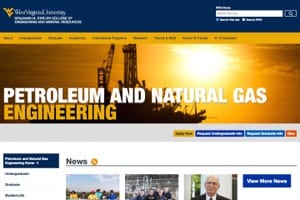 West Virginia University (WVU) is situated close to the mighty Marcellus Shale geological formation. The Petroleum and Natural Gas Engineering (PNGE) Department at WVU has great access to research opportunities, and industry players.
West Virginia University (WVU) is situated close to the mighty Marcellus Shale geological formation. The Petroleum and Natural Gas Engineering (PNGE) Department at WVU has great access to research opportunities, and industry players.
As with all of our top picks, the PNGE department boasts state of the art research facilities, with 4 distinct departments. These are the core analysis, drilling fluids, gas measurement labs and rig floor simulator.
The most frequently mentioned and famous research is probably the Marcellus Shale research department. Here, topics such as porosity and structure are examined, and enhanced extraction techniques are formulated.
High volumes of published technical papers and a 100% job placement rate on graduation show that the faculty, researchers and students all practice what they preach.
Get admissions information for the West Virginia University
What about all the other schools in the USA?
We’ve picked the drillers.com top 10 schools in this article, but the next 10-20 will also offer great opportunities for you. We all know that personal motivation, discipline and suitability are at least as important as the right school. In fact, many of the most respected people in the oil and gas industry worked their way up from low-level positions, and don’t have a degree. (Perhaps honorary ones!)
It might be that you need to study close to home for personal or family reasons. Perhaps you’re the type of bright student that will thrive wherever you are? The top 10 picks all had a link to a submission form to the corresponding university. Below, we have a web form for you to submit your details and get plenty of extra options to consider.
Conclusion:
So, at the time of writing, we’re fairly confident that we’ve nailed the top 10 Petroleum Engineering schools in the USA.
You might be reading this a year or two later, are these still the best colleges and universities in the USA for getting into oil and gas? Are there any missing? Should one or two be deleted, because they aren’t quite major league? Any specific examples, reasons or facts will also be appreciated. For example, new patents and technologies created by students or professors, close ties with major companies etc.
We’re happy to keep this page updated as things change, the recent downturn has affected the numbers of new students looking to enter the industry. Salaries for Petroleum Engineering graduates have remained robust throughout good times and bad.
One other thing to consider is that most graduates are employed by around ten major oil companies. These companies foster relationships with the best engineering schools in order to have their pick of the best and brightest. This happens in other industries too, but especially so in oil and gas. This means that you ought to set your sights high and study hard to get into your first choice school.

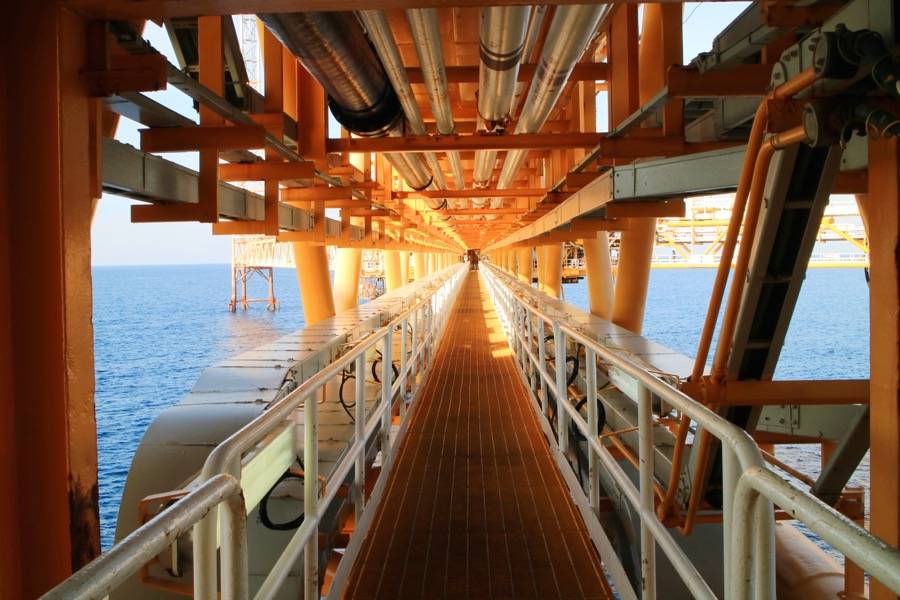



Hi Jason,
Nice article. I am a petroleum engineering aspirant who is going to pursue a master of science degree in the field for fall 2018. I have admits from USC, Penn State and University of OK, Norman here in the US and finding it rather difficult to choose one from the three. My interest is in reservoir engineering. I noticed that USC doesn’t feature in the article top 10 – was there a reason why it was not included despite being highly ranked as a engineering school ? Also, could you please advise me given your research and your oil and gas industry network, which school should I attend this fall for my masters ?
Looking forward to hearing from you.
Thanks & Regards,
Rohan Sakhardande
Hi Rohan,
When compiling the list, I got down to a shortlist of 16 or 17 and I really wanted to ‘drill down’ to a top ten. Some of the criteria was objective, and some more subjective. This was a reason for not ranking them from one to ten, I felt that this was too difficult, and too much responsibility.
USC was one of the late cuts from the article, and was a borderline decision. While it certainly has a great reputation, it wasn’t quite in the same league as the top ten. My contacts repeatedly questioned the inclusion, whereas no-one questioned any of the others listed above.
Another consideration was department size, and number of students graduating every year. The higher profile petroleum engineering schools graduate two or three times the number of people. Since colleges and universities run as a business, a department three times the size indicates a level of success, and often additional facilities.
I can’t pick one for you, that’s too important of a decision I’m afraid… Good luck!
Thank you, Jason. Appreciate your feedback !
Hello Jason,
Firstly , Thank you for this article . I am in the process of enrolling for a masters degree in petroleum engineering and this list has given me an insight into the best colleges available along with their respective advantages.
There are two queries i would like to bring up :
1) Which college would you suggest for further research into Fracking as a key subject matter.
2) I am planning to enroll for the Spring intake. Are there any major disadvantages to this intake in aspects like availability of off – campus internships, job opportunities, Assisitantship . etc .
Looking forward to your reply
Sincerely ,
Austin Itteyra
Hi Austin,
Thanks for visiting my article and taking the time to ask a question. First of all, although I researched this article I’m not really an expert on the topic. You should definitely not make decisions based on what I think. That said, I have a few points for you to ponder…
I believe that more and more, we’re in the ‘hustle economy’ where taking extra-ordinary action and initiative is rewarded. To be able to take action, you need to be near the action.
It’s logical to think that if you attend a college in close vicinity to a major oil field that involves unconventional/shale/tight oil extraction will offer more opportunities to find work later. The best institutions have strong industry ties, it’s no coincidence that some of the best petroleum engineering schools in the world are in Aberdeen or Texas.
Next, research which states are starting to limit or ‘crack down’ on fracing and similar techniques. There are definitely friendly, and unfriendly states.
Lastly, think about where you’ll want to live when you go to work next. There’s likely to be a shortlist of suitable schools, that tick all of these boxes. You’ll want to be in a place where you can interact with people and organizations that are already actively involved in the place you want to be in next. You can’t network as well from afar.
PS Drop the ‘K’ in fracking when dealing with industry people 🙂
Thank you for the reply Jason,
Will keep these points in mind while I continue researching.
PS. I apologise for the mistake. Will commit this to memory.
Hi, Jason, I consider your article very interesting and helpful. However, I would like to receive a suggestion about the best University to pursue a Masters in oil and gas that fits a thesis focusing on oil and gas (exploration, drilling and production) impacts on sensitivity areas (amazon rain-forest, high presence of surrounding aquifers or aquitards and so on)
Thank you in advance.
Hi Leandro,
Interesting question… I don’t have a specific answer for you based on my research. Nowadays, there’s an extremely strong focus on HSE across the industry in general. Due to historic mistakes, political pressures, and public opinion, every school and university is focussed on environmental impact.
My advice would be to write an email to each department on your University shortlist, and see what response you get from them. My guess is that a few responses will show you authenticity and passion for the topic.
Perhaps you could come back to this thread and help future readers understand what you discover?
Hi Jason
Thanks for the list.
I have a 3 years experience working in Oil fields of Middle East. And now I am looking to enroll for MS degree in Petroleum Engineering. Please help me with the following queries
1.) Most of the universities mention that ‘MS- thesis based’ programs are ideal for students looking to get into research field while the ‘Non-thesis’ based program is suited for experienced professional who are looking to boost their job profile and practical knowledge.
Is it true that ‘thesis based’ MS program are generally more preferred by the Companies offering jobs than the ‘Non-thesis based’ ?
2.) Is there no Assistantships or campus internships for Non thesis based MS program ?
Hi Shivam,
I don’t think that I can speak on behalf of any University, and certainly wouldn’t be in a position to contradict them! It’s more likely that they will fact check my published text than the other way round 🙂
A personal decision of this magnitude needs to be fully researched by you. This article was an overview of the top petroleum engineering schools, and not designed to steer people in any definite direction.
You really need to spend a lot of time researching, and asking the Universities themselves regarding specifics.
Thanks for visiting and reading my article!
Hello ,
I have same issue ,you have it ,I have geology bachelor degree ,I want get MS degree ,so have you found any solution to your issue ,please contact me on
[email protected]
Hello Jason,
Great article!!!. I’m a petroleum engineer from Colombia, and I am in the process of enrolling for a masters degree in petroleum engineering for Spring 2019. I have a question… why Stanford University was not included into de list.
Another question, what are the best universities in O&G production?
Thank you so much,
Cesar
Colombia
Hi Cesar,
It’s not that I tried to exclude any institutions, it’s more that I tried to drill down to a top 10.
Stanford would have been in my top 20, perhaps a top 15. It’s well known as one of the top universities in the world, but the accolades are more for entrepreneurship and technology. The petroleum engineering department at Stanford is much smaller than most of my top ten, and wasn’t really mentioned by those who offered feedback.
That said, if you’re already experienced and hard working in the industry, and have a track record, a post graduate degree from Stanford will offer you the same opportunities. We all know that school history is only a part of the person… Intelligence, persistence and aptitude are all more important.
Regards, Jason
Hello Austin I appreciate your work. I am a nigerian and I am interested in university of Oklahoma or uchicago for petroleum engineering undergraduate course but I need scholarship can you guide me.
Hi, do you offer master in petroleum engineering? What is the fee and course duration?
Hi Mike, neither drillers.com or the company behind it (Relentless Pursuit of Perfection Ltd.) directly offer academic courses. Thanks for visiting!
Hello Jason ,thank you for your great work , i like your article.
I have a master degree in petroleum engineering like i wanna to start my phd in us in university with high rank,
could you pls help me to find the 10 top universities for the postgraduate program.
Thank you so much;
Louey Algeria
Hi Louey, Thanks for your kind words, and for taking the time to comment. When I researched this article, I reached out to my network and was able to combine that with online research to create my final ten. Obviously, as we move up the educational ladder there are fewer people qualified to offer an opinion, and it’s more difficult for me to differentiate as an outsider. Researching masters degrees is harder than undergraduate ones. Researching doctorates is harder still.
We have a laundry list of articles to write about at drillers.com and we’d probably cover the topic at some point. If I were you, I’d go back to my previous lecturers and professors and ask them. I bet that they know exactly who they struggle to compete against to entice new students. They’d also be familiar with your individual situation and strengths. Cheers, Jason
Hi Jason Lavis,
Thank you for this wonderful article. I am 28years of age and i dream of pursuing a career in the Oil and Gas industry. I Plan taking transfere courses at the community college aurora ( CCA ) then to Colorado School Of Mines (CSM). Taking my age and current workforce changes, do you think it is worth pursuing?
Hi Frank, I doubt that your age would make any difference in of itself. The oil and gas industry seems to be at the start of an upturn at the moment which means that the job market is likely to improve over the next couple of years.
These are general observations, and there would be no substitute for you contacting CSM directly. Your future is far too important to consider my personal opinions… Pick up the phone, or write them an email! Cheers.
You, just inspired me Jason. Thanks
Jason can also write something about investing in the Oil and Gas Industry. Something for starters and those already in the game.
Eventually, I’ll cover every aspect of the upstream oil and gas industry. Not so sure about the topic of investing. My belief is that experts wouldn’t need my help, and ‘starters’ should avoid investing altogether. At 28, I’d only focus on being debt free and building some savings up. I might look at an article on the topic if I can think of an interesting angle though. Cheers.
I would like to pursue petroleum engineering to become a drilling engineer. Can you please tell me if there is any scholarship conducted for international students?
Hi Ivin, This is something that I haven’t researched. Anything is possible though. The first step would be to contact colleges and universities directly and explain to them why they should give you that kind of opportunity. You would have to make a compelling case as to why it would benefit them when they have domestic students paying tens of thousands of dollars for the same course.
If we look at two hypothetical examples, if you just want to find a way of going to and living in the USA for free, then you have no chance. If you’re a science prodigy and have found groundbreaking solutions to engineering or biochemical problems and just need a place to bring them to fruition, then there’s a good chance you’ll be taken seriously.
Hi Jason:
Thank you for this article. My son is a junior in HS and when he told me he wants to major in petroleum engineering I had no idea what he was talking about! This article was a great help. Just wondering if you happen to know if most in the field pursue a Master’s degree in the subject matter. Just trying to adequately prepare myself.
Thanks again,
Aisha
Chicago
Hi Aisha, I don’t have any official figures on this, but did ask around for feedback from some fairly senior people. Here’s a direct quote from one that seemed to be the consensus:
So, if your son is really sure that he wants to be a petroleum engineer, then the undergraduate degree is the most direct route. The problem is that oil and gas is a boom and bust industry and petroleum engineering students struggle to get jobs in the middle of a crash. In addition, who knows what will happen in alternative energy in the next ten years? I guess that these types of concerns, and keeping options open is the reason for the dominance of mechanical engineering grads joining the industry.
Aisha-
I’m a reservoir engineer at a major company in west Texas. If you have your bachelors in PE, a Masters adds very little. Working immediately out of undergrad (if the oil price at graduation permits) is a much better use of your time. Masters degrees in PE are for people who did another science in undergrad like he said.
So would you recommend earning a bachelors in petroleum engineering over ba in mechanical + masters
Hi Jason!
Thanks for the research and compilation. I was wondering whether you came up with anything on Stanford.
Hi John, Stanford was in my top 20, but didn’t make the top 10. In my discussions with industry people, the University didn’t come up much. That was probably due to the size of the department, rather than the quality of the education.
Hi Jason
My son has been selected to study Petroleum Engineering at the China University of Petroleum.
He spent 1 full year studying Chinese language at Tianjin University to understand their language fully before going to Qingdao to study for another 4 years before graduating.
Unfortunately after completing and passing his Exams, he was not given the chance to continue to Qingdao to enroll for his 1st of 4 years.
Instead, he was told to sponsor himself for another full year at the same school even he passed his Grading Point at 31.5.
As a father, I really want him to take up Petroleum Engineering Courses at any USA Universities so that when he comes back he can work on our Traditional Customary Land where OIL and GAS are seeping out.
We have Geological Mapping and samples tested and want our own children to acquire knowledge to run the show in the near future.
Hope you will help me identify a good University in the US or any other country for my son to enroll.
Thank you
Mr Tanny Dau (Parent)
Papua New Guinea
Jason, in reading comments to your posting(s) so many inquire about scholarship help. Please feel free to direct them to theeducationaltrust.org website. This is the website for the Association of Desk and Derrick Clubs and annually offer $10-20,000 worth of scholarships to individuals pursuing a career in the petroleum and allied industries. Thank you, ET Trustee, Shirley Bridwell
Hi Shirley, thank you so much for commenting here. I don’t know why I didn’t direct people to you already… About to send you an email to follow up.
Hi am STan from Nigeria,i have bsc in business Administration but i want do a short course or a diploma on exploration and production in oil and gas, so I can start up my own oil and gas industry.
is there any college or institute in the USA which you can recommend to me
Stan
Hi Stan, we don’t give personalised advice here. Your next step would be to contact institutions in the USA if you have the financial means to travel, live and study there. If you don’t have such resources, then contacting local companies and career advisors would be the best option. Lastly, you can look at online learning. There are lots of internet courses available to you. Even then, contacting local companies first will help you to decide which courses to choose. If you pick a course that’s not in-demand locally, you might waste time and money. Good luck.
Hello, I’m been applying to colleges for petroleum engineering and was curious about Montana tech. I’ve seen it pop up here and there but I never really get a concrete answer if it’s a decent school worth looking into. Do you know this school and is it decent and worth checking out?
Hi Ryan, Montana Tech didn’t stand out in my original research, but considering we were picking the top ten, that’s a high bar. I’ve asked around and yes, Montana Tech has a good reputation for petroleum engineering and is worth being on your short list. The fact that you’re asking here means that it’s already on your radar, possibly for reasons other than whether it’s the best in the world! Good luck.
Hi Jason,
Any thoughts on a masters program at Cornell for oil and gas?
Hi Kieran, When you asked about Cornell University, the first things that sprung to mind were sustainability, renewable energy and similar. Then I thought about the Marcellus Shale region. I’m not sure that they have a petroleum engineering masters degree. That said, chemical or mechanical engineering masters from Cornell would be a solid qualification that would be attractive to oil and gas companies.
Hi Jason,
Thanks for this article, I am 48 years old working on my PhD in Psychology. In term of getting job that I want, I am planning to study for petroleum engineering would you prefer to study petroleum online or campus and what chance of getting a job if I study online. If so, what best online to study for petroleum engineering. I have no knowledge background whatsoever in petroleum production.
Thanks
Musa Muhamud
Hi Musa, at 48 with no experience in petroleum production it’s going to be a challenge to become a petroleum engineer. I guess that a psychology PhD at 48 is challenging too, so no-one knows better than you if you’re up to it. To start studying Petroleum Engineering, you need a STEM degree, some psychology degrees definitely count as STEM, and others not so much depending on the course modules you’ve taken. Remember, that if you do get a petroleum engineering degree, you’ll be over 50 and competing in a job market against people with 20 or 30 years of experience. I don’t know which country you’re based in or any other background information about you so can’t give any definite advice. You should speak to relevant staff at your current academic institution who know your background. Good luck!
Hi Jason! Thanks for the article! I’m a reservoir engineer from Kazakhstan, and I’m going to do my master degree in the USA. I have 3 offers from the University of Tulsa, the University of Oklahoma and USC( smart oilfield technologies). Can you please advise which university would be best for reservoir engineers? Thanks a lot!
Hi Nursultan, To answer your question to a standard high enough that would ensure that you make the best possible choice would take research. I don’t have time to do additional research right now. You have three great offers on the table. My advice would be to read all three course outlines carefully, bearing in mind your own personal experience and aspirations for the future. I bet, by the end of the final page, you will have made a decision. Try not to overthink it, and good luck.
Hi! Great information! Thanks you. I am currently thinking of attending Texas A&M Kingsville but not sure since they have “Natural Gas Engineering” instead of Petroleum Engineering which is what I wanted to major in. What exactly is the difference? I worked with H&P drilling working floors and the pits and loved it. I really see myself at the company mans position (consultant) and am wondering if Nat. Gas Engineering will get me there. If not, what can I do with that? What do u think about Kingsville A&M? Or ever even heard about it? Thanks again!
Also, I’m 36 and prob won’t be done till 38-40 and live about 1 1/2 hours from Kingsville which is why I’d rather attend here than Austin. Currently U.T.RGV. Do you think I’ll be too inexperienced to be trying to get a position like that? Experience is 3-5 yrs on a rig.
Hi and thanks for stopping by. Mostly, the same engineering techniques get used for petroleum and gas drilling and extraction. A well might be approached and treated differently if there’s a plan for it to be a gas only extraction, but usually, a reservoir will have gas and liquid deposits. The next few years of your life are too important to base on my personal opinion, and you should ask the university about natural gas engineering, and why they don’t have petroleum engineering.
As I’ve answered others previously, your future job hunting will be against other qualified candidates. I can’t help thinking that, all other things equal, a natural gas degree will give you a slight advantage if you apply to a job where gas is the primary production, and a slight disadvantage if you go for a job where oil is being drilled for and extracted.
My daughter is completing B Tech Petroleum Engineering in March 2020 from PDPU, India. She is doing specialization in down stream.
She wants to pursue MS from USA,
She wants to make her career in Consulting or business analytics related to petroleum engineering.
Can you please suggest which University/ post graduation specialization she should target in Fall 2020 admission?
Thanks,
Regards,
Hi Rajesh, at drillers.com we specialise in upstream (exploration and production) not downstream which is retail. This article is written with an upstream perspective. You should read university websites and prospectuses carefully, and look for those that focus on what your daughter is interested in.
My name is Karl and I’ve only been admitted to UTPB for petroleum engineering. I’m trying to get your opinion on studying petroleum engineering here, and any benefits from studying here at UTPB.
Hi Karl, It’s difficult to advise on a personal basis. Do you live near there? Living close is a benefit. Are you asking about the University of Texas? It’s a fine institution. Its looks like the Permian Basin will see some challenges in 2020, and probably 2021, but by the time you graduate, who knows how the job market will be? That’s a million-dollar question for most people in most industries right now.
What’s your opinion on University of Louisiana Lafayette.
Would be in a top 20 article. Hard to pick a 10, so any in a top 20 would be good.
Hope you will help me identify a good University in the USA>
Thank you
I’m looking for help here in Texas to see if and school are students can help me research so pooling that was place on my family land. trying to understand the mapping you can reach me at 9362497316